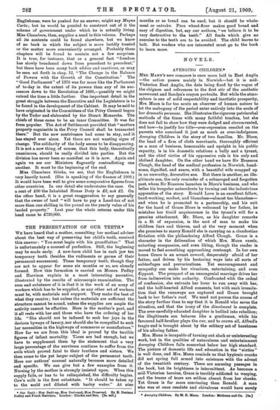THE PRESERVATION OF OUR TEETH.*
WE have heard that a mother, consulting her medical adviser about the best way of preserving her child's teeth, received this answer : "You must begin with his grandfather." That is unfortunately a counsel of perfection. Still, the beginning may be made early. A new-born child has in each jaw ten temporary teeth (besides the rudiments or germs of their permanent successors). These temporary teeth, though they are not to appear for some six months or so, are already formed. How this formation is carried on Messrs. Pedley and Harrison explain in a most interesting narrative, illustrated by the results of microscopic examination. The sum and substance of it is that it is the work of an army of workers which has to be supplied, as any other set of workers must be, with materials and support. They make the best of what they receive ; but unless the materials are sufficient the structure cannot be sound, unless the supplies are ample the activity cannot be effective. Here is the mother's part, and it all rests with her and those who have the ordering of her life. "She should not be induced to seek her joys in the devious byways of luxury, nor should she be compelled to seek her necessities in the highways of commerce or manufacture." How far we are from this ideal is proved by the terrible figures of infant mortality. These are bad enough, but we have to supplement them by the statement that a very large percentage of the survivors continue to suffer from the evils which proved fatal to their brothers and sisters. We then come to the yet larger subject of the permanent teeth. Here our authors' counsel naturally becomes more detailed and specific. We can give but a few examples from it. Nursing by the mother is strongly insisted upon. When this supply fails, or has to be relinquished, the difficulty begins. Cow's milk is the first substitute. "It should be taken up to the scald and diluted with barley water." At nine • OUT Teeth: How Built-up, How Destroyed,liow Preserrosd. By B. Denison redley and Frank Harrison. London: Mackie and Son. Os. net. j
months or so bread can be used, but it should be whole- meal or oatcake. Pure wheat-flour makes good bread and easy of digestion, but, say our authors, "we believe it to be very destructive to the teeth." All foods which give no exercise to the teeth are to be avoided. The child learns to bolt. But readers who are interested must go to the book to learn more.






































 Previous page
Previous page